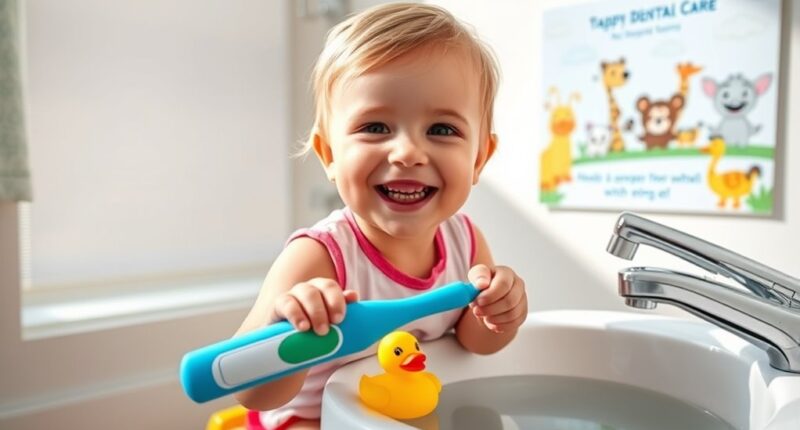Establishing good dental habits for your toddler is essential to prevent cavities and encourage lifelong oral health. Start by cleaning their gums before teeth erupt and brushing as soon as the first tooth appears. Use a soft-bristled toothbrush with a tiny amount of fluoride toothpaste. Make dental visits a regular part of their routine, as this helps catch any issues early. By fostering strong dental practices now, you’re setting the foundation for a healthier smile in the future. Discover more steps to support their oral health.
Key Takeaways
- Start brushing your toddler’s teeth with a soft-bristled toothbrush as soon as the first tooth appears, using a tiny amount of fluoride toothpaste.
- Establish a consistent oral hygiene routine by brushing twice daily for two minutes, using circular motions for effective cleaning.
- Introduce flossing when teeth touch, using child-friendly tools and supervising your child’s efforts to ensure proper technique.
- Schedule dental visits by age one to allow for early detection of potential issues and to create positive associations with dental care.
- Encourage a balanced diet rich in calcium and vitamin D while limiting sugary and acidic foods to support healthy teeth and gums.
Understanding the Prevalence of Dental Caries in Toddlers
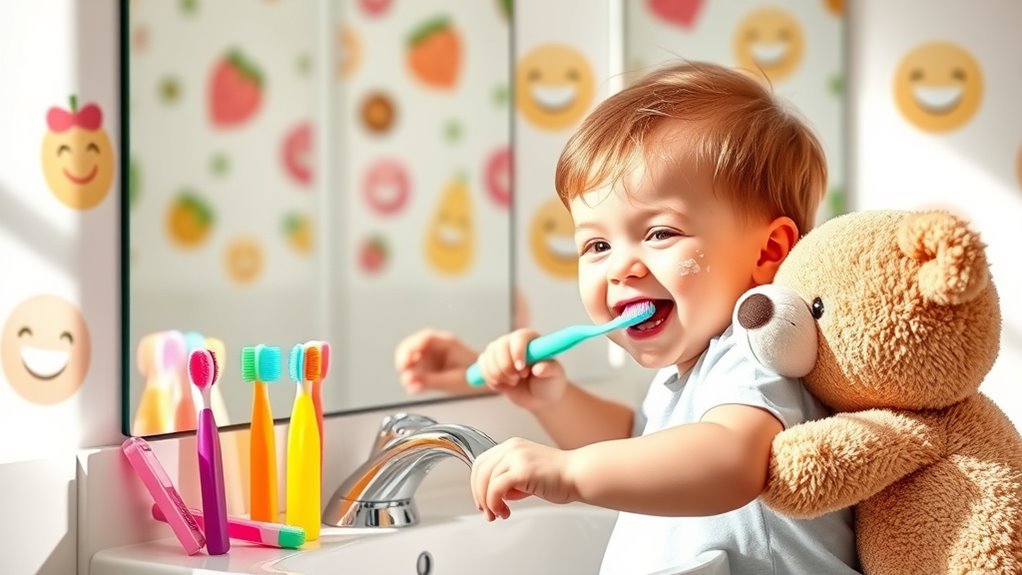
Understanding the prevalence of dental caries in toddlers is essential for promoting their oral health. About 23% of children aged 2 to 5 have experienced dental caries in their primary teeth, with disparities evident among different ethnic groups. For instance, approximately 32.9% of Mexican American children and 28% of Black children are affected, compared to 17.9% of White children. Additionally, children from low-income families are twice as likely to have caries as those from higher-income backgrounds. These statistics highlight the impact of socioeconomic factors and access to care on oral health. Despite some improvements, ongoing disparities persist, making awareness and preventive measures vital for ensuring healthier smiles in all toddlers. Furthermore, financial considerations for elderly care can influence families’ ability to prioritize and afford dental care for their children. It is also crucial to recognize that successful co-parenting tips can play a significant role in maintaining a child’s overall well-being during stressful familial transitions. Regular dental check-ups and preventive measures can significantly reduce the risk of dental caries in young children. Additionally, understanding the importance of advance directives can help families make informed decisions regarding their children’s health care needs. Implementing data analytics in public health initiatives can further aid in identifying and addressing the root causes of dental health disparities.
The Importance of Early Oral Hygiene Practices
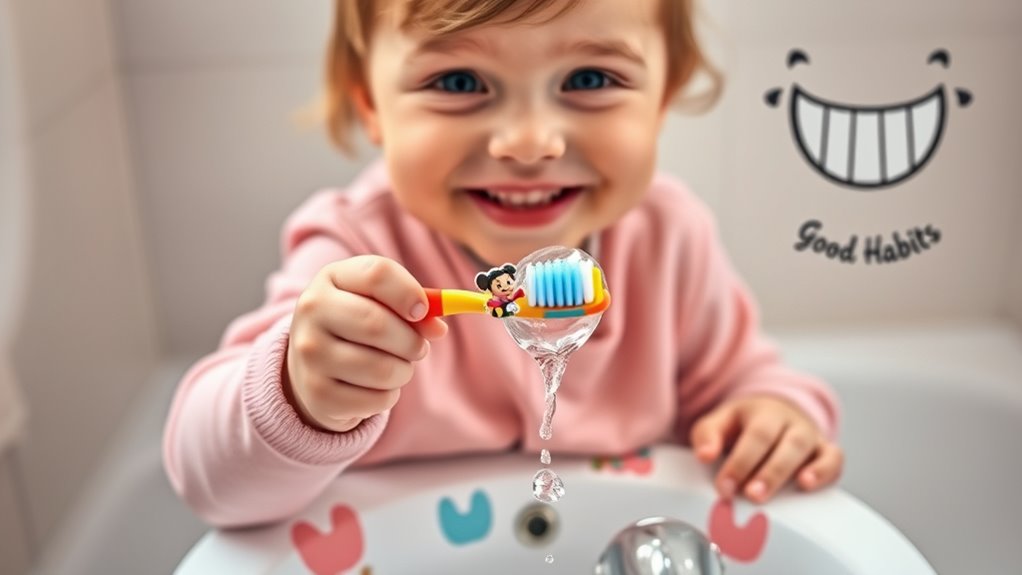
Starting early with oral hygiene practices sets the stage for your child’s lifelong dental health.
By establishing a routine for infant oral care, you can greatly impact their future by preventing cavities and gum disease. Remember, baby teeth aren’t just placeholders—they’re crucial for speech development and guide permanent teeth into the right positions. Additionally, critical periods in a child’s development highlight the importance of early intervention in various areas, including dental health. Newborns typically sleep 14-17 hours a day, which allows for optimal growth and development, including oral health. Early intervention in dental care can also help prevent emotional dysregulation, which may impact overall well-being. Engaging in consistent routines can also provide your child with a sense of stability during this critical period.
Neglecting early care can lead to complex dental issues later on. Regular brushing and flossing are important to prevent plaque buildup and tooth decay, which can affect your child’s nutrition and speech.
Plus, scheduling regular dental check-ups guarantees early detection of any potential problems. By prioritizing oral hygiene now, you’re investing in your child’s overall well-being and healthier future. Additionally, fostering a strong bond through training can help your child understand the importance of maintaining good habits, including oral care.
Teaching Effective Oral Hygiene Techniques

Teaching your toddler effective oral hygiene techniques lays the foundation for a lifetime of healthy habits. Start brushing as soon as their first tooth appears, using a small, soft-bristled toothbrush.
For children under three, apply a tiny amount of fluoride toothpaste—about the size of a grain of rice. Brush their teeth twice daily for two minutes, gently moving in circular motions and along the gum line. Don’t forget to include the tongue! Additionally, using a hydrocolloid patch can help if your child experiences any skin irritation from drooling. Regular dental check-ups are essential for monitoring newborn oral health and ensuring proper development. Engaging in playful activities, like using the Montessori Busy Book, can also help reinforce the importance of good hygiene in a fun way. Furthermore, establishing routines around oral care can enhance emotional regulation as children learn to manage their responsibilities.
Supervise them to prevent swallowing toothpaste. Once their teeth touch, introduce flossing using child-friendly tools. Make it fun by counting teeth or using flavored floss. Additionally, consider incorporating healthy snacks for dogs into your child’s diet to promote overall health and well-being.
Celebrate their efforts with praise to reinforce these good practices and guarantee consistent, enjoyable hygiene routines.
The Impact of Diet on Oral Health

While you mightn’t realize it, the food your toddler eats plays a crucial role in their oral health. A diet rich in calcium, found in dairy products and leafy greens, helps form strong teeth and bones. Additionally, a comprehensive business plan can help parents understand the importance of nutrition in their child’s development. Juices like carrot juice can also contribute to oral health by providing essential vitamins that support gum health. Incorporating unique homemade fruit juice recipes can also be a fun way to ensure your toddler gets a variety of nutrients. Eating high protein foods can also support overall growth and development.
Vitamin D, from sources like fatty fish and eggs, aids calcium absorption and supports healthy enamel. Don’t forget phosphorus, which strengthens enamel and is found in lean meats and nuts.
However, be cautious of excessive sugar and acidic foods that can erode enamel and promote decay. Offer fiber-rich fruits and vegetables to clean teeth and stimulate saliva production. Additionally, incorporating solar-powered security solutions can provide peace of mind while your toddler enjoys their snacks.
The Role of Parents in Promoting Oral Hygiene

As you guide your toddler in developing good oral hygiene habits, your role as a parent becomes vital. Your behavior greatly influences their understanding of oral health. When they see you brushing and flossing regularly, they’re more likely to adopt those habits themselves. Additionally, introducing them to fun dental tools can spark their interest in maintaining their oral hygiene.
Establishing a consistent routine, like brushing after meals, helps turn these actions into lifelong practices. Your knowledge of proper techniques is essential; the more you know, the better you can teach. Get involved in oral health education, whether through community programs or school initiatives, reinforcing good habits at home.
Use fun tools and positive reinforcement to make dental care enjoyable, creating a positive environment that encourages your child to embrace oral hygiene. Additionally, engaging in mindfulness practices can help your child develop a more positive attitude towards their dental care routine.
The Importance of Regular Dental Visits
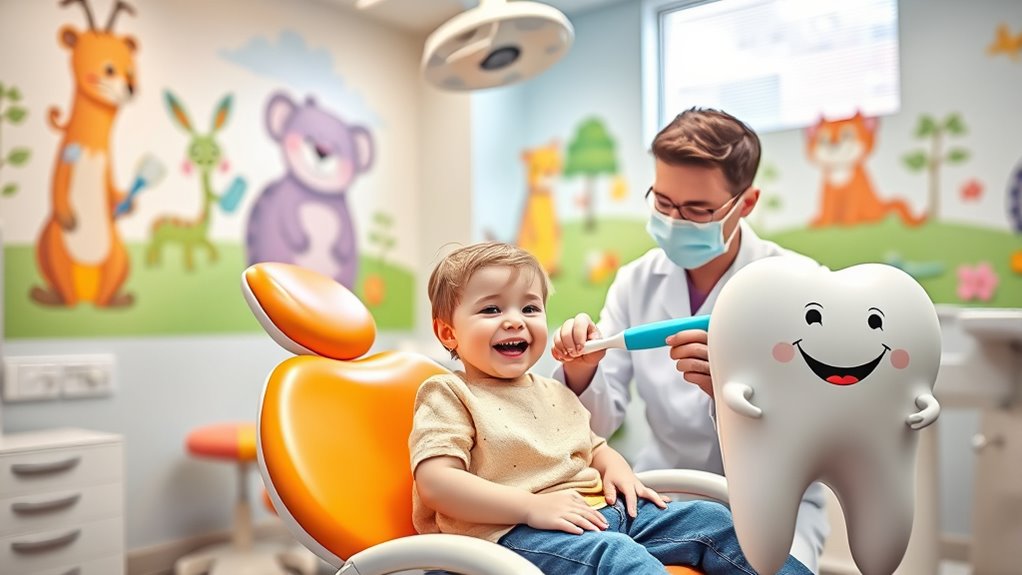
Regular dental visits are essential for ensuring your toddler’s oral health, since they allow for early detection and treatment of potential issues. Catching problems like tooth decay and gum disease early can save you from costly treatments down the line.
During these check-ups, your child can receive preventive care like professional cleanings and fluoride treatments, which help maintain healthy teeth and gums. Dentists also educate your toddler on proper oral hygiene practices and the importance of a balanced diet.
Monitoring dental development is vital too; it helps identify alignment issues that might need attention. By establishing a routine of regular visits, you’re laying a strong foundation for your child’s lifelong oral health and reducing dental anxiety.
Addressing Challenges in Accessing Dental Care

Access to dental care can be a significant hurdle for many families, impacting your toddler’s oral health. Limited access to trained providers, especially for children with special health care needs, makes finding proper dental care challenging.
Behavioral issues can complicate visits, while financial constraints and geographic barriers often prevent timely treatment. Missing early screenings can lead to severe dental problems, increased costs, and even affect your child’s overall health and development.
To improve access, consider community-based initiatives like school screenings and educate yourself about effective oral hygiene practices. You play an essential role in establishing good habits and steering care options, ensuring your toddler receives the dental attention they need for a healthy future.
Racial and Socioeconomic Disparities in Oral Health

Significant racial and socioeconomic disparities exist in oral health, affecting many toddlers and their families.
For instance, Latinx children face a staggering 72% prevalence of tooth decay, while Black children often have higher rates of untreated decay than their White peers. Access to preventive treatments like dental sealants is lower for both Latinx and Black children, highlighting systemic barriers rooted in structural racism.
Even with higher family income, many minority children struggle with poor oral health due to insurance challenges and neighborhood factors. Additionally, food insecurity exacerbates these issues, making it vital to recognize how socioeconomic status influences dental outcomes.
Understanding these disparities can help you advocate for better access to care and resources for your child.
Encouraging Healthy Dental Habits for Lifelong Benefits
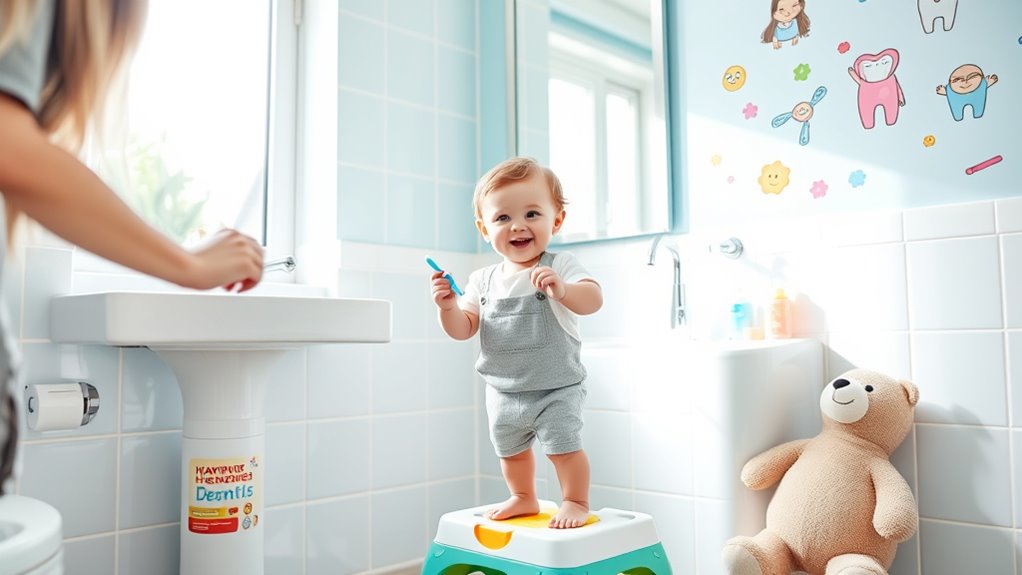
Addressing the disparities in oral health is just the first step; fostering healthy dental habits in toddlers lays the groundwork for a lifetime of good oral hygiene.
Start by cleaning your toddler’s gums with a soft cloth before teeth erupt to reduce bacteria buildup. From the moment their first tooth appears, use a small, soft-bristled toothbrush with water or a tiny amount of fluoride toothpaste.
Cleaning your toddler’s gums and using a soft-bristled toothbrush sets the foundation for healthy teeth from day one.
Schedule dental visits by age one for early detection of issues. Encourage a balanced diet rich in fruits, veggies, and dairy while limiting sugary snacks.
Teach proper brushing techniques and supervise their efforts. Introduce flossing when teeth touch, and establish a dental home for regular check-ups.
These habits guarantee a bright, healthy future for their smiles.
Frequently Asked Questions
What Age Should I Start Using Toothpaste for My Toddler?
You should start using toothpaste for your toddler when their first tooth erupts, usually around six months old.
Use just a tiny smear of fluoride toothpaste, specifically designed for young children. For kids under two, stick to a rice grain-sized amount.
As they grow and improve their brushing skills, you can gradually increase the amount. Always supervise their brushing until they’re old enough to do it safely on their own.
Are There Specific Toothbrushes Recommended for Toddlers?
They say, “A happy child is a healthy child.”
For toddlers, specific toothbrushes can make all the difference. Look for ones with soft bristles to protect their gums and a small head that fits comfortably in their mouth. Ergonomic handles help your little one grip it securely.
Brands like Orajel, Firefly, and Colgate Kids offer colorful, engaging options that make brushing fun. Remember, choose ones with the ADA Seal of Approval for safety!
How Can I Make Dental Visits Less Frightening for My Child?
To make dental visits less frightening for your child, start by using social stories to explain what to expect.
Focus on positive language and show them dental tools through play.
Role-play dentist visits at home to build familiarity, and consider offering virtual tours of the dental office.
Bring a comfort item for reassurance, and praise them for their bravery after the visit.
Engaging activities can transform anxiety into excitement about dental care.
What Are Signs of Early Dental Issues in Toddlers?
You should watch for signs of early dental issues in toddlers, like white spots on their teeth, which can indicate decay.
If they become sensitive to hot or cold foods, that’s a warning sign too.
Discoloration, such as brown spots, may appear, and changes in their eating habits could signal discomfort.
Also, be alert for swollen gums or persistent bad breath, as these might point to underlying dental problems needing attention.
How Often Should Toddlers Drink Water for Optimal Oral Health?
When it comes to hydration, you want to hit the nail on the head by encouraging your toddler to drink water regularly throughout the day.
Aim for at least 4-6 cups daily, especially after meals and snacks. This keeps their mouth fresh and helps wash away food particles.
Conclusion
To sum up, establishing good dental habits in toddlers is essential for their long-term oral health. Remember, “an ounce of prevention is worth a pound of cure.” By prioritizing early oral hygiene practices, teaching effective techniques, and promoting regular dental visits, you can help your child avoid dental issues down the road. Stay proactive about their diet and dental care, and you’ll set them up for a lifetime of healthy smiles.
